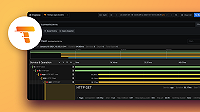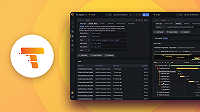This is documentation for the next version of Tempo. For the latest stable release, go to the latest version.
Search with AWS Lambda
Caution
The Tempo serverless feature is now deprecated and will be removed in an upcoming release.
This document explains how to set up AWS Lambda for serverless backend search. Read improve search performance for more guidance on configuration options for backend search.
Build the code package:
cd ./cmd/tempo-serverless && make build-lambda-zipThis will create a ZIP file containing the binary required for the function. The file name will be of the form:
./lambda/tempo-<branch name>-<commit hash>.zip. Here is an example of that name:ls lambda/*.zip lambda/tempo-serverless-backend-search-297172a.zipProvision an S3 bucket.
Copy the ZIP file into your bucket.
aws s3 cp lambda/tempo-serverless-backend-search-297172a.zip gs://<newly provisioned gcs bucket>Provision the Lambda. For a Lambda function to be invoked via HTTP, we also need to create an ALB and some other resources. This example uses Terraform and only includes the function definition. Additionally, you will need a VPC, security groups, IAM roles, an ALB, target groups, etc., but that is beyond the scope of this guide.
locals { // this can be increased if you would like to use multiple functions count = 1 } resource "aws_lambda_function" "lambda" { count = local.count function_name = "${local.name}-${count.index}" description = "${local.name}-${count.index}" role = <arn of appropriate role> handler = "main" runtime = "go1.x" timeout = "60" s3_key = "tempo-serverless-backend-search-297172a.zip" s3_bucket = <S3 bucket created above> memory_size = 1769 # 1 vcpu vpc_config { subnet_ids = <appropriate subnets> security_group_ids = [<appropriate security groups>] } environment { variables = { "TEMPO_S3_BUCKET" = "<S3 bucket name backing your Tempo instance>" "TEMPO_BACKEND" = "s3" "TEMPO_S3_HEDGE_REQUESTS_AT" = "400ms" "TEMPO_S3_HEDGE_REQUESTS_UP_TO" = "2" "TEMPO_S3_ENDPOINT" = "s3.dualstack.us-east-2.amazonaws.com" } } }Add the hostname of the newly-created ALB to the querier config:
querier: search: external_endpoints: - http://<alb dns hostname>


